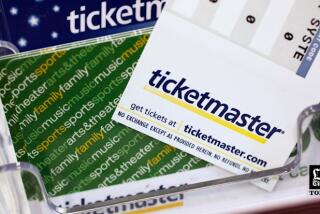Diller to Buy Remaining Half of Ticketmaster
Media mogul Barry Diller agreed Tuesday to purchase the remaining half of Ticketmaster Group Inc., putting him one step closer to his vision of becoming a predominant player in the emerging world of electronic commerce, where the Internet and television increasingly are used as outlets for selling merchandise.
Diller, who controls USA Networks Inc., agreed to swap stock worth about $400 million for the 50% of the Los Angeles-based ticketing company he does not already own. The increased bid, which was accepted by the Ticketmaster board, is expected to satisfy key shareholders who rejected as too low an offer in October of about $340 million.
The sweetened offer, which values Ticketmaster at about $900 million, is almost certain to win shareholder approval. It also signals the likely departure of Ticketmaster chief Fredric Rosen, the architect of the companyâs growth who had resisted Dillerâs probing management and vigorously opposed the original proposal.
The bigger question is what the purchase says about the direction of the entertainment business. It also speaks to whether Diller, chief architect of the Fox broadcasting network and whom Wall Street views as a human barometer of the business, is striking the right chord in viewing electronic commerce as the industryâs next frontier.
Over the last two years, Diller has assembled a motley group of media properties that bear no resemblance to the neatly integrated conglomerates of Time Warner and the Walt Disney Co. that concentrate on producing huge volumes of television shows and movies to feed their vast cable and broadcast pipelines. In contrast, Diller owns a second-rate band of television stations, a first-rate home shopping channel and, last month, took charge of most of Universal Studiosâ television operations, including one of the top-rated cable channels, the USA Network and such programs as Jerry Springer, a syndicated talk show, and the dramatic TV series, âLaw & Order.â Now, he will add to that the worldâs largest ticketing company with a strong Web site and speedy international growth.
While the television business today is based primarily on the ability to extract advertising and subscription revenues from broadcast and cable networks, Diller is betting on riding the development of a third revenue stream, retail transactions.
The idea is that shopping from home will become a breeze as the Internet gets speedier and more pervasive and as advanced digital set-top boxes make television a two-way transactional medium with the swipe of a credit card.
âThis is blue-sky stuff and a preemptive strike to be first by Diller,â said analyst Art Rockwell of Rockwell Capital in Los Angeles. âLike a lot of these technology-driven ideas in Hollywood, the hype comes first and the reality comes years down the road.â
Diller is assembling a new generation of media enterprise to capitalize on that bet. Through the purchase of Ticketmaster and the electronic retailing operation he owns in Home Shopping Network, Diller could become a powerhouse in electronic sales. Each organization fields 60 million calls a year from potential buyers and has state-of-the-art systems in place to ship orders.
In addition to fulfilling orders for others, Diller plans to create more opportunities to use the combined capacities of his operations himself. Dillerâs plan is to broaden beyond Home Shoppingâs core audience to reach all kinds of shoppers.
Ticketmaster, which dominates the field in selling tickets to live events in the U.S., has access to a younger clientele and has moved aggressively to develop its Web site as a way to sell tickets. Diller also recently struck a joint venture with the nationâs leading Spanish television broadcaster, Univision, to create a Spanish shopping network.
And in November, Diller bought into CitySearch, a Pasadena-based company that creates online city guides with entertainment and cultural listings and classified ads. (Times Mirror Co., which owns the Los Angeles Times, also is an investor in CitySearch.)
Diller says his businesses will all feed off one another. âCitySearch is a local business in the same way that Ticketmaster is a local business,â he said.
Ticketmasterâs own online business has been growing exponentially since November 1996, with ticket sales increasing by 20% a month so far this year. Its goal is for online purchasing to account for 5% of its total sales of about $2.7 billion by the end of the year.
CitySearch and Ticketmaster could drive Internet surfers to each otherâs sites.
Diller said the two services will also dovetail with the focus of his station group on youth culture and local programming.
Sales on the Internet are growing and high-speed connections being offered by cable operators are expected to make the process less laborious. Tele-Communications Inc., a leading cable operator and one of the largest investors in Dillerâs USA Networks, is at the forefront of a movement to develop advanced digital boxes that could become available next year.
Other media companies also are eyeing the third revenue stream. For instance, as the economics of its traditional broadcast business deteriorate, NBC, for one, is trying to leverage its CNBC financial news channel into a vehicle for selling information on personal investing and mutual funds. Sources say a joint venture NBC struck last year with Dow Jones & Co. is a precursor to such an endeavor and that bringing in a partner such as Fidelity, the mutual fund manager, would not be out of the question.
Diller purchased his initial 50% of the worldâs largest ticketing company last May in a stock swap valued at $210 million. Stock in Dillerâs company has since doubled in value, meaning that his purchase of the second half of Ticketmaster arguably is costing less than the first.
Rosen, Ticketmasterâs CEO, said he was content with the new offer and believed it reflects the âfair valueâ of the company.
Rosen, who built the company virtually from scratch beginning in 1982, is expected to leave before his contract expires at the end of the year. He will leave with more than 1 million Ticketmaster options to cash in. While Rosen has been at odds with Diller, he has agreed to help through a transition to new management.
Some analysts and Ticketmaster insiders worry that the company could struggle without Rosenâs leadership. He has nurtured deep loyalties within his work force and among the venue owners who have provided Ticketmaster with virtual monopolies over their ticket sales nationally. Sources said Diller, however, is confident he can find new management that will cost him less, cut overhead at the company and continue its operation smoothly.
While Ticketmaster has only made modest profits on the 70 million tickets it sells a year, it throws off tremendous amounts of cash. Analysts say cash flow is expected to nearly triple this calendar year, to more than $60 million, in part because of strong online and overseas growth. Rather than cannibalizing telephone sales, nearly one-quarter of the online sales were to new customers, according to the company.
More to Read
The biggest entertainment stories
Get our big stories about Hollywood, film, television, music, arts, culture and more right in your inbox as soon as they publish.
You may occasionally receive promotional content from the Los Angeles Times.










